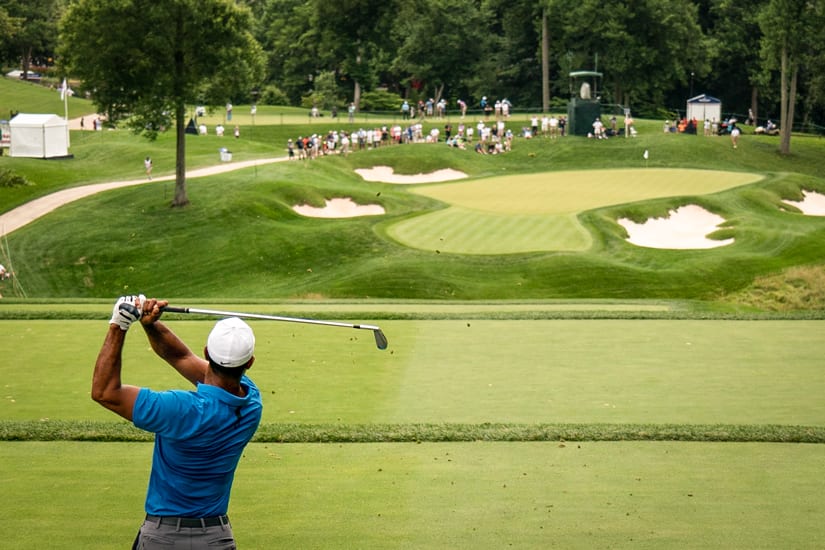The timing of a lawsuit blaming Tiger Woods for the drunk driving death of an employee smells of disreputable legal strategy.

By Matthew E. Bass, attorney at Burnett & Williams P.C., Loudoun, Fairfax, and Northern Virginia
As Tiger Woods prepares to play in the 2019 PGA Championship, which begins today, news spread that Tiger is being sued for wrongful death by the family of one of his employees, who died after drinking at The Woods, Tiger’s Jupiter, Florida, restaurant. The lawsuit claims that Woods and his girlfriend, Erica Herman (who is also the general manager of the restaurant), were drinking with Nicholas Immesberger, 24, several days before the crash, even though they knew that he was a recovering alcoholic. The lawsuit goes on to state that on the day he died — December 10, 2018 — Immesberger began drinking at The Woods after he finished his afternoon shift, and that drinking by employees was promoted by staff at the restaurant. Immesberger allegedly had a blood alcohol content of .256 (more than three times the legal limit of .08) when he crashed his car and died that same evening.
If this wrongful death case were in Virginia, it would be highly unlikely to succeed.[i] On multiple occasions, the Virginia Supreme Court has adhered to the common law principle that provision of alcoholic beverages to another, whether in the context of social host or licensed vendor (such as a restaurant), is too remote to be a proximate cause of injury to a third party resulting from the negligent conduct of the purchaser or consumer of the alcohol.[ii] The underpinning of the common law is that individuals, drunk or sober, are responsible for their own torts, and therefore drinking the intoxicant, not furnishing it, is the proximate cause of the injury.[iii] Each time it has considered the issue, the Court has observed that it is not insensitive to the “carnage caused by drunk drivers.”[iv] However, the Court has stated that the Virginia General Assembly is in the best position to deal with the myriad of social, economic, and policy considerations at work in deciding whether to impose civil liability on one who furnishes alcohol to another.[v]
From a broader perspective, the timing of the news about the wrongful death lawsuit raises an eyebrow.

Tiger is fresh off arguably one of the greatest comeback stories in sports history following his historic win at The Masters in April. He was also recently awarded the Medal of Freedom by President Trump and is a favorite to win this week at the PGA Championship.
While Immesberger’s untimely death is a tragedy, the fact that the wrongful death lawsuit hit the news cycle just days before Woods tees off in search of his 16th major championship threatens the integrity and reputation of personal injury lawyers, and reinforces an offensive stereotype that they can be opportunistic attention-grabbers. Was the timing of the suit meant to persuade Woods to quickly and quietly settle a wrongful death case that, at least under Virginia law, wouldn’t have very strong legal teeth? Is the suit a personal shot at Tiger, meant to distract him from focusing on his pursuit of Jack Nicklaus’ record 18 majors? A cynic could conclude that it is meant to do both.
I expect that Tiger’s legal team will fight the allegations vigorously.[vi] If recent sports-related legal news has revealed anything, it’s that fighting a legal battle is easier when you have plenty of money to fund the fight. Just ask Robert Kraft.
If you have questions about a potential wrongful death case in Virginia, please contact the attorneys at Burnett & Williams at 703-777-1650, where our experience has led to record wrongful death verdicts in Virginia.
i. The author is not licensed in Florida and cannot comment on whether this is a viable wrongful death case under Florida law. Importantly, each state is free to develop its own laws regarding negligence, whether that be through the state’s legislative body, its court system, or both. Laws that cover the responsibility of an establishment, such as a restaurant, for over-serving patrons are generally referred to as “dram shop” laws.
ii. Robinson v. Matt Mary Moran, Inc., 259 Va. 412, 525 S.E.2d 559 (2000); Williamson v. Old Brogue, 232 Va. 350, 350 S.E.2d 621 (1986).
iii. Id. “Proximate cause” is a cause which in natural and continuous sequence produces the accident, injury, or damage. It is a cause without which the accident, injury, or damage would not have occurred. Virginia Model Jury Instruction No. 5.000. Proximate cause should be distinguished from “causation in fact,” which has been discussed by Virginia courts as an element or subset of proximate cause, and is often described as the “but for” or sine qua non rule. Nationally, there is some disagreement about whether “causation in fact” is a subset of proximate cause or whether cause-in-fact, in addition to proximate cause, together create “legal cause.” See Ford Motor Co. v. Boomer, 285 Va. 141, 736 S.E.2d 724 (2013). Virginia courts prefer the former.
iv. Williamson, at 353.
v. In Williamson, the Court rhetorically asks: “Should tavern owners alone be subjected to liability or should social hosts be liable, too? If social hosts are liable, will minors be accountable as well? Should the intoxicated purchaser have a cause of action against the tavern owner or the social host? And, should any new rule be retrospective or prospective only in its application?” Id. at 355. It should be noted, however, that criminal liability can be imposed in certain circumstances, for example, in providing alcohol to a minor. For more on underage drinking laws in Virginia, see my blog https://burnettwilliams.com/contributory-negligence-virginia/ (August 3, 2017). Additionally, it is a Class 1 misdemeanor to sell alcohol to an intoxicated person. Va. Code § 4.1-304. Those licensed to sell alcohol may be subject to further administrative sanctions for selling to intoxicated persons. 3 VAC 5-50-10.
vi. It should be noted, however, that this case is likely to initially have insurance implications. For example, The Woods restaurant’s insurance company may take part in investigating and defending the case. Tiger’s personal homeowners and umbrella insurance carrier(s) may also be involved. In theory, this could be independent of, or in collaboration with, a defense team Tiger himself employs to defend the case.